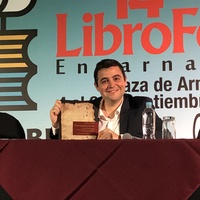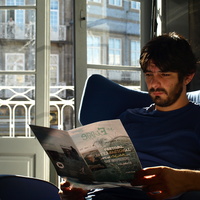Books by Ian Merkel

Editora da Universidade de São Paulo, 2024
Teriam tido as ciências sociais o mesmo desenvolvimento no século XX sem que Claude Lévi-Strauss,... more Teriam tido as ciências sociais o mesmo desenvolvimento no século XX sem que Claude Lévi-Strauss, Fernand Braudel, Pierre Monbeig e Roger Bastide tivessem vivido no Brasil? Para Ian Merkel, o que entendemos por ciências sociais francesas foram profundamente marcadas pela história da USP e das universidades brasileiras, em geral. Neste estudo, oferece uma nova história do intercâmbio internacional entre os anos de 1930 a 1960, analisando as trocas, afetivas e intelectuais, que estes intelectuais realizaram entre si e também com os interlocutores e as realidades sócio-históricas que encontraram aqui. A colaboração com intelectuais brasileiros como Caio Prado Jr., Mário de Andrade, Gilberto Freyre, entre muitos outros, se prolongaria por toda a carreira deles e influenciaria sua compreensão do colonialismo, do sincretismo religioso, da economia global e dos fundamentos das estruturas sociais, de maneira mais geral.

University of Chicago Press, 2022
A collective intellectual biography that sheds new light on the Annales school, structuralism, an... more A collective intellectual biography that sheds new light on the Annales school, structuralism, and racial democracy.
Would the most recognizable ideas in the French social sciences have developed without the influence of Brazilian intellectuals? While any study of Brazilian social sciences acknowledges the influence of French scholars, Ian Merkel argues the reverse is also true: the “French” social sciences were profoundly marked by Brazilian intellectual thought, particularly through the University of São Paulo. Through the idea of the “cluster,” Merkel traces the intertwined networks of Claude Lévi-Strauss, Fernand Braudel, Roger Bastide, and Pierre Monbeig as they overlapped at USP and engaged with Brazilian scholars such as Mário de Andrade, Gilberto Freyre, and Caio Prado Jr..
Through this collective intellectual biography of Brazilian and French social sciences, Terms of Exchange reveals connections that shed new light on the Annales school, structuralism, and racial democracy, even as it prompts us to revisit established thinking on the process of knowledge formation through fieldwork and intellectual exchange. At a time when canons are being rewritten, this book reframes the history of modern social scientific thought.
Storia della Storiografia, 2022
Talks by Ian Merkel

Journal of the History of Ideas Podcast, 2023
In this latest episode of In Theory, Disha Karnad Jani interviews Ian Merkel, author of the recen... more In this latest episode of In Theory, Disha Karnad Jani interviews Ian Merkel, author of the recent book, Terms of Exchange: Brazilian Intellectuals and the French Social Sciences (University of Chicago Press, 2022).
https://www.jhiblog.org/2023/09/25/terms-of-exchange-disha-karnad-jani-interviews-ian-merkel/
Merkel’s work questions the idea of an insular French social science, by putting Brazilian intellectuals at the centre of a transatlantic exchange of ideas. Through professional and personal networks including Claude Lévi-Strauss, Fernand Braudel, Mário Andrade, Gilberto Freyre, and others, Merkel draws together critical elements of modern social science, such as the Annales school, theories of race, and structuralism, and shows how the interactions between these thinkers formed the basis of these ideas and were set against huge political upheavals such as the Second World War and Brazil’s 1964 coup.
Papers by Ian Merkel
History of Anthropology Review 46, 2022

BEROSE International Encyclopaedia of the Histories of Anthropology
This article examines the life and work of Laurette Séjourné (1914–2003), archaeologist and anthr... more This article examines the life and work of Laurette Séjourné (1914–2003), archaeologist and anthropologist of Mexico. As the first of its kind in any language, the article provides a biographical portrait, covering Séjourné’s early career as a film editor and her archaeological work in Mexico with the Instituto Nacional de Antropología e Historia (National Institute of Anthropology and History). It introduces Séjourné’s field-based monographs on Teotihuacan and Quetzalcoatl, her broader synthetic works such as Pensamiento y religión en el México antiguo, and her more politically engaged writings during the early years of Cuban socialism. Despite occupying a somewhat controversial role as a cultural interpreter at a time in which the discipline of archaeology became much more professionalized and scientific, Séjourné influenced scholars such as Miguel León-Portilla through her studies on religion and Teotihuacan. The article concludes by examining some of these controversies in light of the challenges that Séjourné faced as a woman and a foreigner in earning recognition for her work.

Modern Intellectual History, 2020
This article analyzes how debates concerning Brazilian race relations, miscegenation, and racial ... more This article analyzes how debates concerning Brazilian race relations, miscegenation, and racial democracy unfolded in France in the 1950s. During those years, Gilberto Freyre and those critical of him emerged in French social scientific discourse, offering distinct visions concerning race, culture, and the possibility of harmonious coexistence in a world structured by racial, social, and colonial inequalities. Certain French social scientists such as Lucien Febvre and Fernand Braudel embraced Freyre's vision as a possible source for racial and cultural mixing, whereas others, especially Alfred Métraux and Florestan Fernandes, directly criticized his work. Roger Bastide mediated between the two, translating Freyre's Casa-Grande & Senzala and coauthoring a UNESCO-based study on blacks and whites in São Paulo that largely repudiated Freyre's claims. I argue that in a period in which decolonization was already underway, Freyre piqued the interest of French social scientists looking to overcome the growing antagonism between colonizer and colonized, even if other models of cultural integration and autonomy contested the validity of Brazil's so-called racial democracy.
World History Commons, 2021
Ideas do not confine themselves to national borders, and thus intellectual exchange provides an i... more Ideas do not confine themselves to national borders, and thus intellectual exchange provides an invaluable lens for exploring world history. Tracing how knowledge develops and ideas spread requires a close analysis of exchange of ideas across regions — sometimes across large distances. In this essay, Ian Merkel relates how historians research intellectual exchange, what kinds of sources they use, and how this exciting area of scholarship can help us better understand world history.

These previously untranslated essays by Fernand Braudel are invaluable sources for understanding ... more These previously untranslated essays by Fernand Braudel are invaluable sources for understanding the social sciences in a formative moment, as well as the relationship between French intellectuals and the colonial world. Published in Portuguese at the University of São Paulo during Braudel's tenure there between 1935 and 1938, they are translated into English here to make them more widely available to historians of France. “The Concept of a New Country” compares and contrasts the semicolonial relationship of Brazil and Algeria to Europe, and “The Teaching of History and Its Guidelines” sheds light onto Braudel's specific interdisciplinary interventions and how Brazil was part of a restructuring of the field of history in France. As a preface to the essays, I contextualize Braudel's tenure in Brazil and develop certain arguments of the essays so that readers less familiar with Brazil and the French university missions can grasp their full implications.
Ces essais de Fernand Braudel, nouvellement traduits, sont des sources pour comprendre les sciences sociales à un moment formateur, ainsi que le rapport entre les intellectuels français et le monde colonial. Publiés en portugais à l'Université de São Paulo pendant que Braudel y donnait des cours entre 1935 et 1938, ils sont publiés ici en anglais pour les rendre plus accessibles aux historiens étrangers. « The Concept of a New Country » compare le rapport semi-colonial du Brésil et de l'Algérie avec l'Europe, et « The Teaching of History and Its Guidelines » offre une perspective sur l'interdisciplinarité braudelienne, comme sur la manière dont le Brésil a contribué à la restructuration du champ de l'histoire en France. Dans sa préface à ces essais, Ian Merkel analyse le séjour de Braudel au Brésil, pour que les lecteurs puissent mieux comprendre les missions universitaires françaises et leur importance.
NACLA, 2019
Jair Bolsonaro’s first month in office has been even worse than imagined, as the administration m... more Jair Bolsonaro’s first month in office has been even worse than imagined, as the administration moves to loosen gun laws and pass a hardline penal reform amid corruption allegations against incoming senator Flávio Bolsonaro.
Storia della Storiografia, 71 · 1/2017, 2017
This article deals with various aspects of Caio Prado Jr.’s elaboration of historical temporaliti... more This article deals with various aspects of Caio Prado Jr.’s elaboration of historical temporalities. It focuses on Prado’s dialogue with the French historian Fernand Braudel in the 1930s and the 1940s. Our purpose is to highlight coincidences between Prado and Braudel’s understandings of temporality and how those understandings may have been mutually influential. We suggest possibilities for further analysis of this intellectual exchange, using personal documents such as correspondence from the Private Archive of Caio Prado Jr. (IEB-USP). This article approaches Braudel and Prado’s thought in a transnational perspective between France and Brazil, shedding new light on two intellectuals dear to Intellectual History and the History of Historiography.
Book Reviews by Ian Merkel
Hispanic American Historical Review, 2025
Between 1965 and 1976, Michel Foucault went to Brazil five times. Although his stays were short, ... more Between 1965 and 1976, Michel Foucault went to Brazil five times. Although his stays were short, he established relationships with intellectuals and activists that, Marcelo Hoffman argues, furthered his philosophical questioning, social critique, and legacy. Foucault in Brazil documents Foucault’s travels, lectures, and publications in Brazil, as well as his dialogues with intellectuals such as Roberto Machado, Maria Lucia da Souza,
Ubirajara Rebouças, and Marilena Chaui. At times, it also explores a provocative question: Just how important was Foucault’s experience of the Brazilian dictatorship—its torture and discipline—for the development of his ideas that would culminate in Discipline and Punish, first published in 1975?
Hispanic American Historical Review, 2024
Review of:
The Remnants of Race Science: UNESCO and Economic Development in the Global South. By ... more Review of:
The Remnants of Race Science: UNESCO and Economic Development in the Global South. By Sebastián Gil-Riaño. Race, Inequality, and Health. New York: Columbia University Press, 2023.
H-LatAm, 2022
In 1948, just a few years after its founding, the United Nations established the Economic Commiss... more In 1948, just a few years after its founding, the United Nations established the Economic Commission for Latin America (ECLA, CEPAL in Spanish and Portuguese). Through extensive archival research and an elegant exploration of the interplay among national, regional, and global dynamics, Margarita Fajardo provides a new history of the institution, the principal thinkers who worked within it, and the ideas they generated. As a contextual intellectual history that explores ideas concerning trade, development, and dependency, The World That Latin America Created will be of interest to historians of Latin America, historians of international relations, and social theorists, to name just a few. It is also an eminently teachable book, which situates and explains concepts and policies of political economy, both for Latin America and international development more broadly.
French Politics, Culture & Society, 2021
Neste último livro de Andrew Sartori, o autor trata da questão do " liberalismo plebeu " de uma m... more Neste último livro de Andrew Sartori, o autor trata da questão do " liberalismo plebeu " de uma maneira que promete mudar a direção da historiografia. Os discursos e a ideologia liberais foram considerados, até recentemente, como produtos da elite. Nesse sentido, a ideia do contrato social de Locke, por exemplo, protegia a propriedade destas mesmas elites. Sartori, cujo foco é Bengala no século XIX (hoje em dia dividida entre a Índia e Bangladesh), traz à luz atores liberais pelos quais a história intelectual nunca se interessou: os pequenos proprietários (raiyats) que podiam ser " Lockeanos " sem nunca terem lido Locke. Esses pequenos proprietários, Sartori mostra, usaram argumentos em defesa da propriedade de tal forma que consolidaram normas liberais relativas ao uso produtivo da terra e ao valor-trabalho.
Séminaires et conférences by Ian Merkel
On the occasion of the bicentennial of Brazil’s proclamation of independence (September 7,1822), ... more On the occasion of the bicentennial of Brazil’s proclamation of independence (September 7,1822), this conference examines the paradigm of “dependency theory.” We will consider both how Brazilian intellectuals contributed to dependency theory and what their analyses offer for thinking about Brazil’s independence and place in the world today. The oeuvre of Brazilian dependentistas insisted on the impossibility of understanding the history of Brazil and Latin America without considering the complex dynamics between the national and the international, between domestic political and economic structures and the broader world system of which they were part. This conference, 200 years after Brazil’s formal independence, evaluates the promise and limitations of their analysis, at once historicizing dependency theory and using the authors associated with it to better understand the present.
Conference Presentations by Ian Merkel
Grupos de trabalho 09h00 às 11h00 Edif. Filosofia e Ciências Sociais GT01-Redes transnacionais de... more Grupos de trabalho 09h00 às 11h00 Edif. Filosofia e Ciências Sociais GT01-Redes transnacionais de intelectuais: circulação de intelectuais e ideias Sala 12 O que fazem os "intelectuais" na internet? Elementos para uma prosopografia











Uploads
Books by Ian Merkel
Would the most recognizable ideas in the French social sciences have developed without the influence of Brazilian intellectuals? While any study of Brazilian social sciences acknowledges the influence of French scholars, Ian Merkel argues the reverse is also true: the “French” social sciences were profoundly marked by Brazilian intellectual thought, particularly through the University of São Paulo. Through the idea of the “cluster,” Merkel traces the intertwined networks of Claude Lévi-Strauss, Fernand Braudel, Roger Bastide, and Pierre Monbeig as they overlapped at USP and engaged with Brazilian scholars such as Mário de Andrade, Gilberto Freyre, and Caio Prado Jr..
Through this collective intellectual biography of Brazilian and French social sciences, Terms of Exchange reveals connections that shed new light on the Annales school, structuralism, and racial democracy, even as it prompts us to revisit established thinking on the process of knowledge formation through fieldwork and intellectual exchange. At a time when canons are being rewritten, this book reframes the history of modern social scientific thought.
Talks by Ian Merkel
https://www.jhiblog.org/2023/09/25/terms-of-exchange-disha-karnad-jani-interviews-ian-merkel/
Merkel’s work questions the idea of an insular French social science, by putting Brazilian intellectuals at the centre of a transatlantic exchange of ideas. Through professional and personal networks including Claude Lévi-Strauss, Fernand Braudel, Mário Andrade, Gilberto Freyre, and others, Merkel draws together critical elements of modern social science, such as the Annales school, theories of race, and structuralism, and shows how the interactions between these thinkers formed the basis of these ideas and were set against huge political upheavals such as the Second World War and Brazil’s 1964 coup.
Papers by Ian Merkel
Ces essais de Fernand Braudel, nouvellement traduits, sont des sources pour comprendre les sciences sociales à un moment formateur, ainsi que le rapport entre les intellectuels français et le monde colonial. Publiés en portugais à l'Université de São Paulo pendant que Braudel y donnait des cours entre 1935 et 1938, ils sont publiés ici en anglais pour les rendre plus accessibles aux historiens étrangers. « The Concept of a New Country » compare le rapport semi-colonial du Brésil et de l'Algérie avec l'Europe, et « The Teaching of History and Its Guidelines » offre une perspective sur l'interdisciplinarité braudelienne, comme sur la manière dont le Brésil a contribué à la restructuration du champ de l'histoire en France. Dans sa préface à ces essais, Ian Merkel analyse le séjour de Braudel au Brésil, pour que les lecteurs puissent mieux comprendre les missions universitaires françaises et leur importance.
Book Reviews by Ian Merkel
Ubirajara Rebouças, and Marilena Chaui. At times, it also explores a provocative question: Just how important was Foucault’s experience of the Brazilian dictatorship—its torture and discipline—for the development of his ideas that would culminate in Discipline and Punish, first published in 1975?
The Remnants of Race Science: UNESCO and Economic Development in the Global South. By Sebastián Gil-Riaño. Race, Inequality, and Health. New York: Columbia University Press, 2023.
Séminaires et conférences by Ian Merkel
Conference Presentations by Ian Merkel
Would the most recognizable ideas in the French social sciences have developed without the influence of Brazilian intellectuals? While any study of Brazilian social sciences acknowledges the influence of French scholars, Ian Merkel argues the reverse is also true: the “French” social sciences were profoundly marked by Brazilian intellectual thought, particularly through the University of São Paulo. Through the idea of the “cluster,” Merkel traces the intertwined networks of Claude Lévi-Strauss, Fernand Braudel, Roger Bastide, and Pierre Monbeig as they overlapped at USP and engaged with Brazilian scholars such as Mário de Andrade, Gilberto Freyre, and Caio Prado Jr..
Through this collective intellectual biography of Brazilian and French social sciences, Terms of Exchange reveals connections that shed new light on the Annales school, structuralism, and racial democracy, even as it prompts us to revisit established thinking on the process of knowledge formation through fieldwork and intellectual exchange. At a time when canons are being rewritten, this book reframes the history of modern social scientific thought.
https://www.jhiblog.org/2023/09/25/terms-of-exchange-disha-karnad-jani-interviews-ian-merkel/
Merkel’s work questions the idea of an insular French social science, by putting Brazilian intellectuals at the centre of a transatlantic exchange of ideas. Through professional and personal networks including Claude Lévi-Strauss, Fernand Braudel, Mário Andrade, Gilberto Freyre, and others, Merkel draws together critical elements of modern social science, such as the Annales school, theories of race, and structuralism, and shows how the interactions between these thinkers formed the basis of these ideas and were set against huge political upheavals such as the Second World War and Brazil’s 1964 coup.
Ces essais de Fernand Braudel, nouvellement traduits, sont des sources pour comprendre les sciences sociales à un moment formateur, ainsi que le rapport entre les intellectuels français et le monde colonial. Publiés en portugais à l'Université de São Paulo pendant que Braudel y donnait des cours entre 1935 et 1938, ils sont publiés ici en anglais pour les rendre plus accessibles aux historiens étrangers. « The Concept of a New Country » compare le rapport semi-colonial du Brésil et de l'Algérie avec l'Europe, et « The Teaching of History and Its Guidelines » offre une perspective sur l'interdisciplinarité braudelienne, comme sur la manière dont le Brésil a contribué à la restructuration du champ de l'histoire en France. Dans sa préface à ces essais, Ian Merkel analyse le séjour de Braudel au Brésil, pour que les lecteurs puissent mieux comprendre les missions universitaires françaises et leur importance.
Ubirajara Rebouças, and Marilena Chaui. At times, it also explores a provocative question: Just how important was Foucault’s experience of the Brazilian dictatorship—its torture and discipline—for the development of his ideas that would culminate in Discipline and Punish, first published in 1975?
The Remnants of Race Science: UNESCO and Economic Development in the Global South. By Sebastián Gil-Riaño. Race, Inequality, and Health. New York: Columbia University Press, 2023.
This seminar is based on discussion and research. While our common readings will help to provide a critical vocabulary around different kinds of populism, your research will focus on a leader, movement, or phenomena of your choosing. Ultimately you will produce a paper of
roughly 3,000 words.